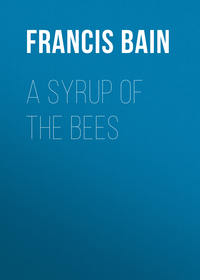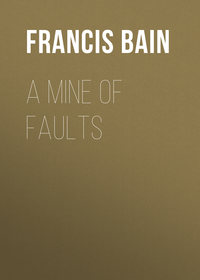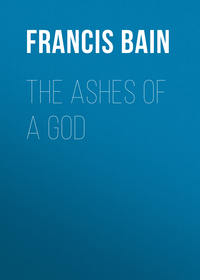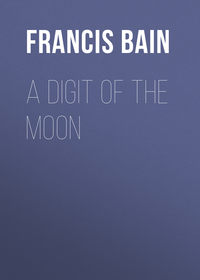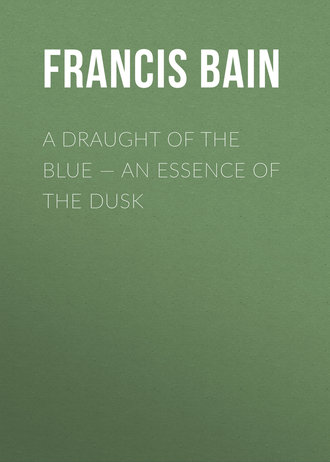 полная версия
полная версияA Draught of the Blue – An Essence of the Dusk
32
Ganesha and Kama, the gods of good luck and love; certainly two formidable antagonists.
33
It is one of the conventions of Hindoo poetry that the petals of the lotus are eight or sixteen in number.
34
Let go! Let go!
35
Though nothing can be less romantic than a canal, gliding through that of Suez is a strange experience at night. Your great ship seems to move, swift and noiseless, through the very sand: and if only you could get there without knowing where you were, you would think that you were dreaming.
36
Háwa, in Canarese, is the name of Ráhu.
37
I did not count them, but there were several dozen, nearly all different. I have reason to believe that this man must have been one of the disciples of a former very celebrated snake charmer, who was known all over India.
38
See, he makes obeisance.
39
Which we may roughly render: Hood of snake brings joy and rue, this to moon and that to you. In all Oriental saws jingle counts for much.
40
"Tutsi, in this world hobnob with everybody: for you never know in what guise the deity may present himself." In the original it is a rhyming stanza.
41
Being actually smeared with ashes. The god is of course Shiwa, and the allusion is to his Ardhandri, or half male, half female form.
42
This punning assonance is precisely in the vein of the original.
43
This name (pronounce Aj- to rhyme with trudge), meaning both unborn and a goat, is a name of the sun (who was a
44
The Lokapálas, or regents of the world, often thus appealed to, are eight: Kubera, Isha, Indra, Agni, Yama, Niruti, Waruna, and Wayu: and they ride on a horse, a bull, an elephant, a ram, a buffalo, a man, a "crocodile," and a stag.
45
When she was lost in the gambling match, and Duhshásana tried to strip her, as he pulled off one dress, another appeared below it, refusing to leave her naked.
46
Still the name of Marwar.
47
Durgá or Párwatí.
48
A Ghandarwa, or heavenly musician, and the dancing master of the Apsarases. [Pronounce tum- to rhyme with room, rather short.]
49
April.
50
It may not be superfluous to remind the English reader that, according to Hindoo ideas, there is no disgrace like that of possessing an unmarried daughter. Hence the practice, among the Rajpoots and adjacent peoples, of destroying the female infants, to avoid it.
51
Intending, of course, a son. Unfortunately he employed a word of indeterminate gender: hence the lamentable dénouement. For in ancient India, as in ancient Rome, the spoken word, the letter, determined everything.
52
Nothing in Hindoo mythology is more absurd than the implacable fury of the most holy men for the most trifling slights, unless it be the accuracy with which their most dreadful imprecations are literally fulfilled. This was, I believe, characteristic also of the saints of Erin.
53
An English lady having called, not long ago, at the house of a Hindoo lady, to enquire how she was, after an interesting event, and what was the result, received for answer: Alas, memsahib, nothing at all: a girl. Had she been a partisan of "woman's rights," she would probably never have recovered from the shock.
54
A play on words, not transferable to English.
55
It is a very bad omen, in India, for a vulture to settle on a house.
56
A female vulture. I retain the original word, because it seems to be peculiarly expressive of the thing.
57
That is, marry her.
58
This was the privilege of kings' daughters.
59
A play on words: meaning also more affectionate.
60
An actress and a dancer are in Sanskrit denoted by the same word.
61
This method of disposing of objectionable suitors is unfortunately not available in Europe. A great swallowing capacity is a feature of the species Rákshasa. The "coming as soon as thought of" (dhyátágata) is the Indian equivalent of "rubbing the lamp" in the Arabian Nights.
62
Who ever loved that loved not at first sight? Every Oriental would side with Shakespeare in this matter: love, in the East is not love, unless it comes like a flash of lightning.
63
This might be either that of a woman or a snake, for the Nagas, to whom she belonged, waver between the two. The Naga, it may be well to remind the reader, is a being possessed of magic powers, especially that of glamour or blearing the eye, which appealed so powerfully to Spenser and Sir Walter Scott.
64
Krishna, whose colour, it is to be noted, is blue.
65
In every sense of the word: mohaiálamáyá is stronger than any English equivalent.
66
The Underworld, the home of the snakes.
67
A tree with very black bark and white blossoms, dear to erotic poets, such as, e. g., Jayadewa.
68
It is a wonderful thing to see a cobra move. Nothing can describe it.
69
That is, the Beauty of the arched eyebrows. (Pronounce Nat- to rhyme with but.)
70
In Sanskrit, hunting and wooing can be mixed up together by plays on words.
71
An emperor. Hindoo idols are dressed and undressed, like dolls, by their officiating priests.
72
She means, he was her Creator.
73
The Hindoos have no word, because they have not the idea, of an idol. They call it a god or an image. Our word idol implies the antagonism to paganism involved in Christianity, and no two books are more alike than S. Augustine's City of God and Ward's Hindoo Mythology.
74
Though, in Europe, this insidious appeal might lack force, it is otherwise in India: whose millions doubt their former birth no more than they doubt their own existence. It is not long since a woman in Cutch burned herself with her own dead son, because, she averred, he had been her husband in her former birth.
75
The physician of the gods, the Hindoo Æsculapius.
76
The Samwáhanam is one of those old Hindoo medical resources which we have only recently been wise enough to copy.
77
Wishámritam: lit. poison-nectar.
78
Also means without affection.
79
In all Oriental stories, statements are proved not by Aristotelian syllogism, but by "instances": and we are reminded of the opinion of the artful Retz, that "one never persuades anybody, but anybody can insinuate anything."
80
Benáres. The lady in question was one of those Hindoo Aspasias of whom many similar stories are told.
81
Which we might translate Aromatic: it includes the ideas of red colour and pungent perfume.
82
Or, as we say, castle in the air.
83
A regular trade in medieval India.
84
Everything in this story is exactly in harmony with the manners of medieval India. The Thags often preserved a woman for her beauty, when they murdered every one else.
85
The reader should remember that in Sanskrit, love and recollection are the same word.
86
The Sanskrit dwipa has exactly the same connotation as our islands of the Blest, and like them it is placed in the setting sun.


